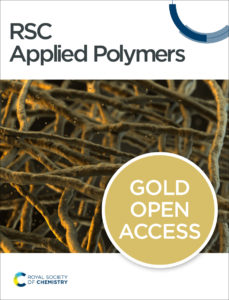RSC Applied Polymers has published its first articles. To celebrate this we wish to introduce some of our #RSCAppliedfirst50 authors and their recently published articles.
In this post we feature corresponding author Dr Baris Kumru for the article ‘Algae-derived partially renewable epoxy resin formulation for glass fibre reinforced sustainable polymer composites‘.
An Introduction to ‘Algae-derived partially renewable epoxy resin formulation for glass fibre reinforced sustainable polymer composites’ by Dr Baris Kumru.
Polymers are pivotal parts in modern composite systems. In this study, we investigate the potential use of renewable thermosets as composite matrix.
In this study, we attempt to investigate the potential of algae-derived epoxidized phloroglucinol (PHTE) as a potential substitute of diglycidyl ether of Bisphenol-A in commercial laminating systems (Epikote/Epikure 04908) which uses linear amines as fast-curing agents. Throughout a comparative study, we performed resin engineering to optimize PHTE resin recipe, and followed by glass fibre reinforced composite formation. It is seen that PHTE offers better thermomechanical properties than Bisphenol-based resin, which opens the door for sustainable composite generation.
We will continue to screen a library of renewable epoxy systems for composite formation. We will translate resin engineering into composite systems which is vital in composite manufacturing. Additionally, we work on frontal polymerization for composite generation and vitrimeric composite systems, where we will merge our findings into these activity areas.
As ‘Sustainable Composites’ special issue highlights, that the sustainability of composites utterly rely on new sustainable chemistries. Despite many articles focusing on renewable resin synthesis, their translation into composite manufacturing faces many hurdles. Bridging composite expertise with chemistry is the key to form scalable sustainable composites. For this reason, I urge everyone in chemistry, engineering, industry and government with a resin-composite research to openly collaborate on a large scale. If we want to construct a sustainable world by all means (chemical industry, materials, composites…) we should put aside egos and start collaborating for our future!

Baris Kumru
Dr. Baris Kumru studied chemistry (BSc and MSc) at Istanbul Technical University in Turkey between 2010-2016. Then, he obtained his PhD in 2019 at Max Planck Institute of Colloids and Interfaces. Since April 2022 he is an assistant professor at Delft University of Technology in the Faculty of Aerospace Engineering. His current interests are photoactive composites from nano to macroscale, sustainable polymers and polymer composites for aerospace applications, functional polymer design, polymer based catalysts and frontal polymerization where he and his team develop materials both for academic and industrial interest.
Dimitrios Apostolidis, William E. Dyer, Clemens A. Dransfelda and Baris Kumru
RSC Appl. Polym., 2024, Advance Article. DOI: 10.1039/D3LP00174A
 |
RSC Applied Polymers is a leading international journal for the application of polymers, including experimental and computational studies on both natural and synthetic systems. In this journal, you can discover cross-disciplinary scientific research that leverages polymeric materials in a range of applications. This includes high impact advances made possible with polymers across materials, biology, energy applications and beyond. |



